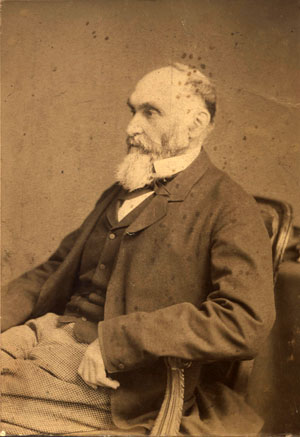

"AGRICULTURAL EDUCATION Northumberland-
I beg to reply to your circular and have read the articles mentioned by you. I however, find the task you have set me a most difficult one, as a man can scarcely write his autobiography without appearing very egoistical, and he, perhaps, may bring forward facts that few now living ever knew, and all may have forgotten; however I shall give you anonymously, a sketch of my business life, and you can make such use of it as you think likely to be useful. I may begin by saying that I had no (so called) agricultural education. I has such an education as was given to any middle class gentleman’s son, and what I learned of farming was chiefly by running or riding about my father’s farms during holidays. For some time we had a tutor at home, but it was found not to answer, as I showed much more taste for horses, cows, and sheep than books; and as my father intended me to be a merchant in London, I was sent to Kings College, London. While there I went of my own fancy to an old man in Cheapside who taught bookkeeping and surveying. This was cut short by my being called home to take my father’s place, he having been appointed to an office which caused him to remove to a distance, and gave him such constant occupation that he seldom was able to come and see me more than twice a year, and for a couple of days at a time; and when I applied to him for advice he generally replied that I, on the spot, should be better able to judge than he at a distance. I have since thought that although he had a certain degree of confidence in me, he really wished to teach me self-reliance by leaving me to my own resources. I was then 17 years of age; I had the charge of a farm of near 1000 acres on which I lived; one adjoining of about 600 acres; one of 1200, and one near it of about 500; these 10 miles distant from my residence, and one my father’s property, five miles further off. I started with good heart at once, delighted to exchange streets for fields and hedges. I had land of almost every quality, from stout clay to light sand and gravel, growing a great variety of crops, requiring different cultivation, and keeping all sorts of stock, from the heavy Shorthorn and Leicester sheep to the Galloway and West highlander and Cheviot sheep. I was for many years the first man on the farm out in the morning. I usually saw the distant farms twice a week. I planned and ordered everything that was done, and sold every head of stock and all corn myself, auction marts and cattle salesmen then not being in vogue. I must say that I learned more by close observation and experience than from reading. I certainly tried what I read of, but very often did not find them answer my land, climate or something. And I found very frequently what was best for my clay land, very bad for my light soils, and what answered best on my gravels, useless on my clays: and when I found that using Peruvian guano on newly limed land (which in theory I was taught should not be) answered to perfection, I began to trust my own knowledge of my business rather than what I saw in journals. I feel bound to say however, that it was not entirely love for farming or live stock, much less the love of hard work, that caused me to take so determinedly as I did to business, but much owning to my passionate love of hunting, which induced me to rise early and take long rides before many were up, and to write at night while many of my acquaintances of my own rank were dining or smoking. And I had a feeling that my father could not find fault with me for taking a day’s hunting, when he heard I was one of the hardest workers, and most regular attenders to business in the country; nor did he, and I believe to this day that was the making of me as a business man. I went on so till I was about 24 or 25, when owing to a variety of circumstances, other farms came under my management, and at one time I was managing about 8000 acres of farming. Also soon after this land agencies began to be offered to me, and at times I have received rents and managed estates to the extent of near £100,000 a year, planning and carrying out the various improvements on them. I was in 1853 appointed as inspector under the Inclosure Commissions for England and Wales, and have acted in 6 counties. Results, however, are the only satisfactory guide, and unless these are good, it may be said that so and so would have been a rich man had he had an agricultural education. It is difficult and painful to enter on the subject. I may say however that I never got or inherited any money or any property in my life. Owing to circumstances my father could leave me nothing, and from the same cause I lost a very large sum of money. However in farming I first of all worked out and paid off the capital on the farms I had to begin with. I went on and bought the property on which I live, and an adjoining one. I have never been a saving man; I have always lived comfortably. I am now an old man, and have been relieved of a considerable portion of my work by my son, but still do not find a fair allowance of work oppress me, either in mind or body.
A practical agriculturalist." A note at the end of this article is written in his son George's handwriting: "G. A. Grey."
George Annett Grey
Born 12 December 1815 at Milfield Hill
Died 20 January 1886 at Milfield Hill, aged 70.
Estate manager, Farmer, Wine Importer, J. P. and D.L. for Northumberland, Assistant Inclosure Commissioner, Huntsman, and Gentleman.
Below right: In memory of the children of George Annett and Elizabeth Boyd GREY of Milfield Hill in this Parish. Georgina died from the effects of a fall 18th August 1847 aged 12 weeks. Robert Charles after whooping cough 22nd March 1850 aged 1 year 5 months. Charles of measles 18th January 1855 aged l year I 1 months. Also the above named Elizabeth Boyd GREY who died in childbed. November 18th. 1856 aged 36 years 7 months
Section B Row 8 at Kirknewton
Left: In memory of Elizabeth Neil GREY born 20th January 1841. died 10th January 1906 Kirknewton.
Section C Row 4-9
George took over the tenancy of Milfield Hill from his father John in 1833, when he was 17.
"George Annett Grey bought Milfield Hill, of which he was already tenant, from Earl Grey in 1850, Milfield Demesne from Charles William Orde in 1862, and Milfield Ninths from Sir Francis Blake in 1877." From A History of Northumberland, Vol XI, 1922.
His eldest son John George died young, so Milfield passed to his second son George in 1886.
George Annett kept diaries of his early years. They are currently being transcribed and can be read here.
Left: Newspaper article from large Milfield Scrapbook. No date (Possibly 1882)
Likely to have been from a sporting Publication.
Mr. George Annett Grey
Mr. George Annett Grey of Milfield Hill, Northumberland was born in 1816, being eldest son of John Grey Esq. of Dilston who for many years acted as receiver and manager of the extensive estates belonging to the Greenwich Hospital; his mother being Hannah Eliza, daughter of Ralph Annett Esq. of Alnwick, Northumberland. He was educated at Kings College London; married first in 1839 Elizabeth daughter of Robert Neil Esq and secondly in 1858 Elizabeth Jane daughter of Henry Morton Esq. of Lambton. Mr Grey at a very early age, on his father's appointment above mentioned, succeeded himself to the management of several large estates in Northumberland but before this his name was known in the shires and in the border counties as a thorough sportsman and straight rider to hounds. His career has been a long and steady one, as he commenced riding to hounds regularly at the age of 17 and after 50 years devotion to the sport of Kings now goes as straight and independently as the youngest man in the hunt. Yet with all this devotion to hunting he has lived a busy and useful life managing large concerns of his own as well as well as several of the largest estates of nobleman and gentleman in the North, and also acting as assistant Inclosure Commissioner for England and Wales, besides being an active county magistrate and Deputy lieutenant. Mr Grey commenced his hunting career when Major St Paul was master, and after with the late Lord Marjoribanks (then Mr Robertson of Ladykirk.) Subsequently he hunted with the Earl of Wemyss, who took the North of Northumberland and Berwickshire which he hunted 5 days a week for twenty- eight years during which time Mr Grey acted as his secretary, and it is a boast that during that period 28s were not paid for damages, doubtless owing to Mr Grey's popularity as well as that of the noble master. On Lord Wemyss retiring Mr Askew of Pallinburn took and hunted the country, and then Sir John Marjoribanks for a like period. On his retiring Mr Grey offered to take the country south of the Tweed or North Northumberland, and hunt it three days a week without any guaranteed subscription; but this arrangement fell through and the country was divided between the Duke of Buccleuch and Earl Percy. After two years experience this arrangement was not found to work well, owing to the great distance between some of the meets and the kennels; whereupon Mr. Grey who in the meantime had hunted the hill country two days a week at his own expense, offered to hunt the country East of the Hill hitherto hunted jointly by the Duke of Buccleughh and Earl Percy which is a good low country, and will afford him one or two days a week. This he has undertaken to do in addition to the hills without asking for any subscription; yet is the feeling of the country that that his exertions to show sport should be fittingly acknowledged and it is understood that not only hunting men but many who are not will lend their aid, and no one doubts that he will show good sport. His son George carries the horn, with an establishment of well mounted men and a kennel of hounds that are well up to their work; whilst the sport they have already shown is an ample guarantee of what the residents in the district may fairly expect.
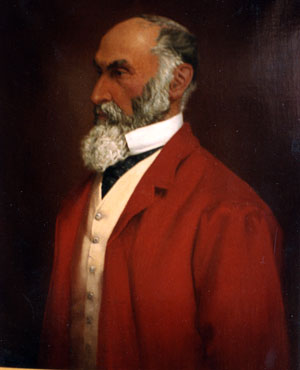
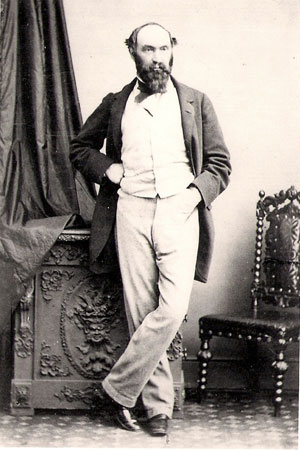
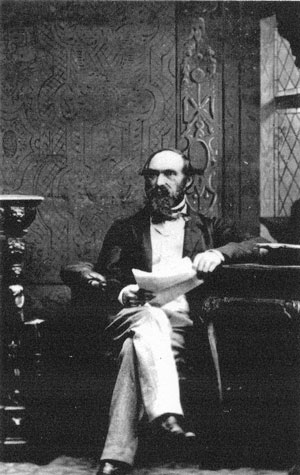
The Stranger’s Ride
Or a Tweedsider at Melton Mowbray
Tune- “Cheer Boys Cheer”
Up, boys up, I hear the bugle sounding,
Up laggards up! will ye lie abed all day?
Up boys, up! and see the good horse bounding –
‘Tis a gallant steed, how he longs to be away.
Out boys, out! jump quick into the saddle,
‘Tis a glorious morn, see the sky is cloudy pale:
The squire is spurring fast, and the farmer he’s astraddle
The old grey mare, like a feather bed on rail.
Start boys, start! ride gently to the cover:
Hark! do you hear the good hounds eager bay?
See! they are in – they are hunting – now ‘tis over –
They have found, they have found, and the fox he’s stole away.
Off boys, off! down to your business settle –
T’will be a sharp run by the line the rascal chose:
Off boys, off! this day will try your mettle,
And honour to the man who’s first in at the close –
Mind boys, mind! be careful of the stranger,
Or he’ll be in before you at the death:
Mark how he rides regardless of the danger –
Never drawing rein, and never holding breath.
Ha! He’s in front; he’ll keep it too – he’s gaining
Though he never saw the country till today;
Where the hounds go he follows – all disdaining
Short cuts and easy – that’s the only way.
Yes! he’s in front; e’en Cardigan’s behind him –
Cardigan, who ne’er started but he won;
Try him again, and still in front you’ll find him,
For ‘tis his customed place and he’ll yield it up to none.
Long shall his fame live – long shall it be dwelt on,
How England’s best was vanquished on that day.
How England’s best – the pride and power of Melton,
Did all they could, yet were beaten by a Grey.
Melton Mowbray
January 1857 E.D.G.O.
Mr Grey of Milfield son of Mr Grey of Dilston a crack rider and a crack farmer too.
(The poem is signed in pencil at the top - G.A. Grey.)
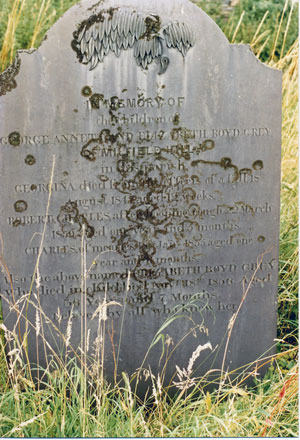

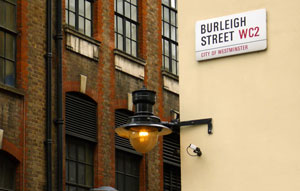
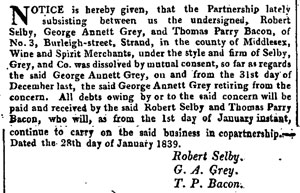

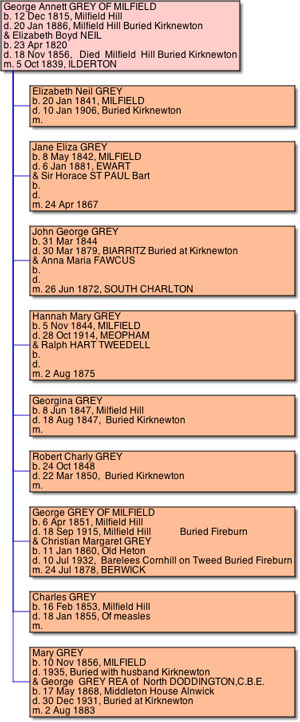
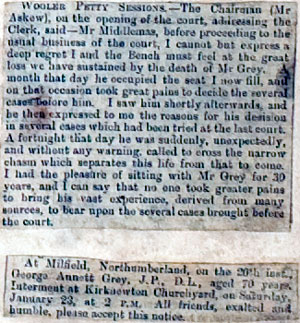
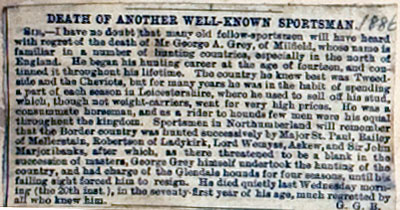
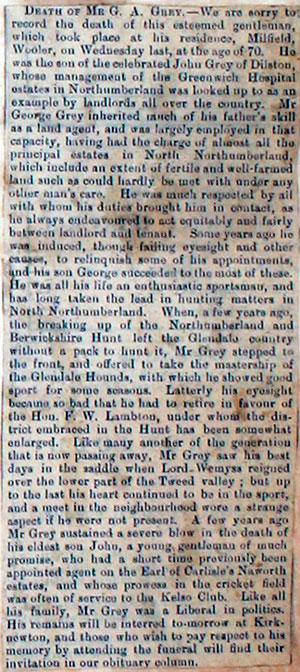
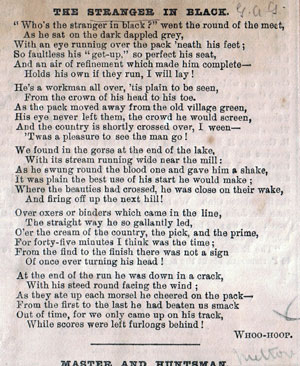
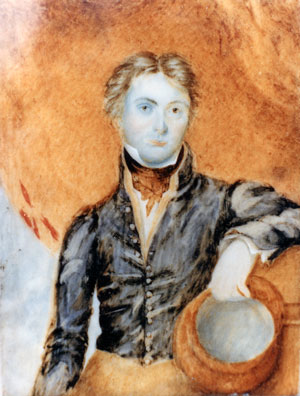
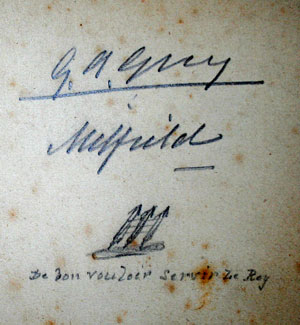
From :" RECOLLECTIONS OF MRS EMILY GREY THOMAS", George's youngest sister.
" A great event stands out clearly – being very carefully and warmly dressed very early one morning for a drive of about 50 miles in our large family carriage, many of us being packed into it – and with luggage behind and my Father driving – he hardly ever let any other hands hold the reins of his two valuable horses. After a time I was hoisted up over the front onto the high driving seat – a wee thing with short legs sticking straight out in front and a wide strap holding me on beside my Father who looked such a magnificent powerful man towering above me and the two lovely strong horses trotting along so freely and Father bending over to talk to me or pointing with his whip to clusters of rabbits which scuttled off with a flash of their white tails as we drew near and hid in great rocks – only to give place to more and more. This drive and the scene and my proud position had a great impression on me. This part was Rothbury – no longer a bleak wild rocky place but a beautiful “health resort”. I remember nothing of arriving at Milfield Hill until a terrifying sound startled me. It was the drums of a band – beginning to perform in the hall below. I was carried down by someone reassuringly and held aloft to see all the farm servants and neighbours dancing in a long, cleaned and decorated barn, and great merriment. It was the evening of my brother George’s wedding day. Milfield Hill was my Father’s birthplace and old home and given to my brother when Father came to Dilston, where I, the only one of the family, was born. Milfield is beautifully situated under the Cheviots on the bank of the “Till” – and “Flodden Field” is on the property. My brother was a famous rider and always had splendid hunters. It was the delight of his sisters to visit him and get good mounts. On one occasion when Josie and Hattie – both together were heading the field – (it was one of George’s stipulations that his sisters should keep alongside of him always first and not slacken off so as to get amongst the “riff-raff” in the rear) an old Scotchman – greatly shocked – enquired “Who are those ladies?”. The reply was “The sisters of Mr. Grey”. On which he remarked as quite sufficient excuse for daring riding – “Oh then it’s in the blood, they can’t help it”.
I did not visit him so much as the elder pair – yet remember some enjoyable “mounts” there, when a schoolgirl in my teens. Also of a very early morning dogcart drive to Scremerston near Berwick – breakfast – and then, mounted on a strange horse out of the stables there – directed to go so much by road and then turn aside onto the long smooth sands and gallop fast to reach Holy Island before the tide came up – to join a large picnic party. I was also warned to avoid “quicksands” – not knowing what these were like, I simply risked them in speed and arrived safely as the party were going to lunch with a smoking and panting steed. The large party riding and driving home in the evening – with the sunset glow over the wet sands was enjoyable, as well as had been seeing the ruins and tracing the history from “Marmion” which I knew and liked in those days!
I remember also a drive with George over the border and passing through Yetholm the then known village and gathering place of real gypsies – and his pointing out to me an old woman their “Queen” who had been very lovely and whose husband would not allow her to wash her face lest her loveliness should attract others."
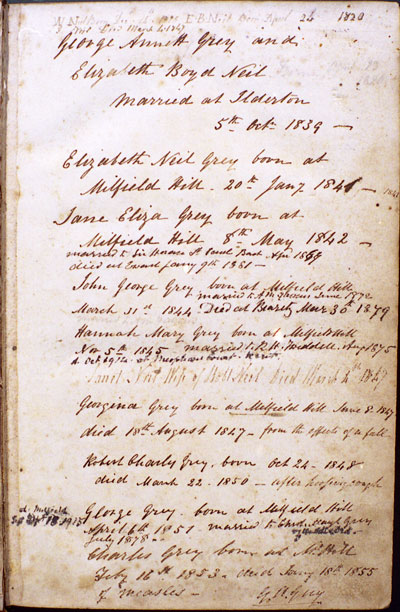
W Neil Born Dec 14th 1815 E B Neil Born April 21st 1820 J Neil Died March 4 1847
George Annett Grey and Elizabeth Boyd Neil married at Ilderton 5th Oct 1839
Elizabeth Neil Grey born at Milfield Hill 20th Jany 1841
Jane Eliza Grey born at Milfield Hill 8th May 1842 married to Sir Horace St Paul Bart Apr 1867 died at Ewart Jany 9th 1881
John George Grey born at Milfield Hill March 31st 1844 Married to A M Maria Fawcus June 1872 Died at Biaritz Mar 30th 1879
Hannah Mary Grey born at Milfield Hill Nov 5th 1845 married to R H Tweddell Aug 1875 D. Oct 1914 Meopham Court Kent
Janet Neil wife of Robt Neil died March 4th 1847
Georgina Grey born at Milfield Hill June 8 1847 died 18th August 1847- from the effects of a fall
Robert Charly Grey, born Oct 24- 1848 died March 22- 1850 - after hooping cough
George Grey born at Milfield Hill April 6th 1851 married Christ Margt Grey of Middle Ord July 1878 Died at Milfield Sept 18 1915
Charles Grey born at M. Hill Feby 16th 1853. died Jany 18th 1855 of measles - G.A. Grey
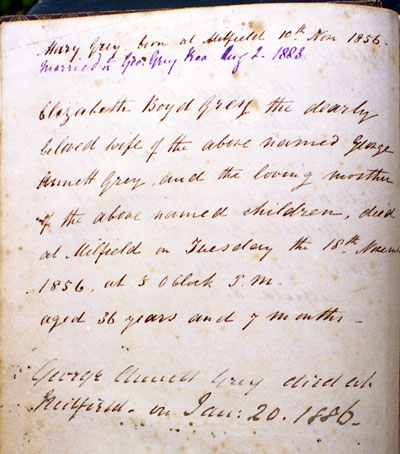
Mary Grey born at Milfield 10th Nov 1856
Married to Geo Grey Rea Aug 2 1883
Elizabeth Boyd Grey the dearly beloved wife of the above named George Annett Grey, and the loving mother of the above named children, died at Milfield on Tuesday the 18th November 1856, at 5 o Clock P.M. aged 36 years and 7 months-
George Annett Grey died at Milfield on Jan: 20 1886
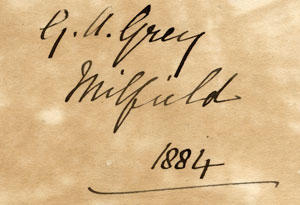
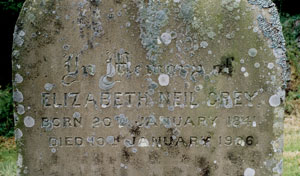
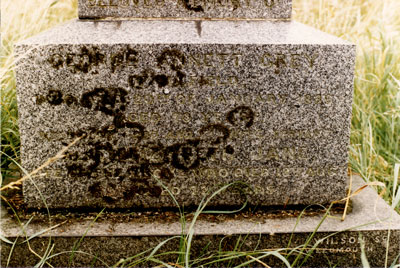
Left: The base of George Annett's grave in Kirknewton. It sits below a large cross.
To the beloved memory of GEORGE ANNETT GREY OF MILFIELD, DIED 20 JANUARY 1886 Aged 70 YEARS.
Well done good and faithful servant.
Also Elizabeth Jane wife of the above who died 18th August 1893 aged 72 years
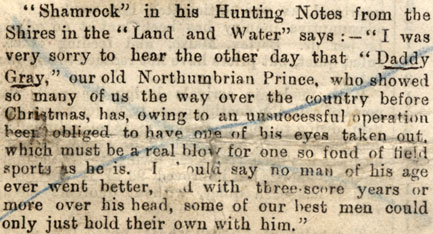
Country Life 7th Dec 1912 A TALE OF THE PAST.
A MEMORY OF GREY OF DILSTON
Does he ride to the front as he used? Does he still retain that verve That made his name so famed for brilliant dash and nerve?
Is he still as keen as of yore to be the first at a fence,
Or have increasing years brought caution as well as sense?
A few must yet be there who knew him long before
Say twenty years ago – or even perhaps still more –
What, forty! Oh, come! And yet the years fly so quickly past
You may be right indeed, but forty! They have got fast! Is it really all that time since the lad came to the front, And held his own with the best of the then crack men of the Hunt?
Can forty years have passed since we had that famous Run?
You know the tale, no doubt, and how he proved number one. Well! I'll tell the tale once more – for it was a famous day. The lad I remember still was riding a well – bred grey. A day of days indeed, for there was a splendid scent,
But close behind the hounds rode the lad wherever they went.
We raced three foxes to death and then at half-past two
We drew again once more though there’d been enough to do. A fox went away in a trice and the Run of the day began. I doubt if a better since was ridden by any man.
It was but that those on the spot, and they were only a few,
Who saw the Run at all, for the hounds I may say flew.
The Huntsman was there, of course – he seldom was left behind –
And the Whip who had viewed the fox, which was off before they could “find”.
The fox set his head for the hills, whose tops were sprinkled with snow, And we settled ourselves to ride as hard as the nags could go.
The under – bred ones ere long had fully more than enough,
For never a check occurred and the country indeed was rough.
When the foot of the hills was reached but seven were left with the pack,
While as we climbed the ascent we had a chance to look back,
And every here and there we saw a dismounted throng,
For the ditches were wide and deep, and the hedges were thick and strong.
But fast as the hounds had run and stiff as had been the line,
The lad by his riding had shown a star was beginning to shine.
When we reached the top of the hill the hounds were scarcely in sight,
And three of us had to stop on account of the horses’ plight.
But four of us then remained, and the lad, well served by his weight,
Drew away from the other three, and to give him his due he went straight.
Little as we might like it we had to follow his lead,
For none of us had any chance to cope with his mare for speed.
And we followed along in his wake till the hounds swung round some rocks,
When they broke from scent to view and it seemed all up with the fox.
We thought it must be caught – but we reckoned without our host!
There's many a well – earned Race which is lost upon the Post.
We saw the hounds were gaining! We watched it a jump a wall
With the leaders at its brush – but it beat us after all!
We hustled along to the dell expecting a kill, but we found Instead that he’d reached the earth and the safely underground.
Well! it was a gallant fox, and I for one was glad,
While the hero of the day we felt was the little lad,
And you say he rides hard still – let us toast him once again. Though for age to vie with youth in active sport is vain!
R. F. MEYSEY – THOMPSON.
Extracts from the Index to the Howard Family Papers held at Durham University Library from the records of the Howard family of Naworth Castle, Earls of Carlisle, relating to their property in Northumberland. Lists the appointment of George Annett Grey and his son John George as agents and holds a number of letters from that role.
N122/Du Cane, R To G.A. Grey, 6 April 1872 (appointment of his son as agent). Also 10 April 1872. To W. Armstrong of Lanercost, 19 November 1878. Copy letter, with eight signatures, to the Trustees in favour of J.G. Grey, n.d.N121/1(x) Draft appointment of J.G. Grey as agent under 1875 Agricultural Holdings Act, 1876.N121/1(xii) Appointment of G.A. Grey as agent under the 1875 Agricultural Holdings Act, 1876.
N90/6 26 June 1861 Letter of Arnold W. White to G. A. Grey as to the lease of Druridge. N90/8(a) 23 November 1864 Letter of W. Woodman to G. A. Grey announcing his decision to give up farming and asking permission to sub-let. N90/8(b) 26 November 1864 Letter of R. Du Cane to G. A. Grey on Mr Woodman's request. N121/24(viii) 14 December 1869 Letter of John Wigham, to G.A. Grey. N121/24(ix) 20 December 1869 Letter of John Wigham, to G.A. Grey. N121/14 4 June 1879 Memorandum by G.A. G(rey) on Killingworth, Long Benton, Stannington arrears.
N122/Grey, G. A., Millfield To R. Du Cane on the following dates: 16 April 1863 14 July 1864 27 January 1869 29 January 1869 8 February 1872 14 April 1872 26 April 1872 11 March 1873 (2 copies) 15 March 1873 22 March 1873 20 March 1874 5 February 1875 31 May 1875 17 July 1875 1 October 1875 13 February 1876 29 February 1876 28 August 1876 23 November 1877 22 December 1877 19 May 1878 16 October 1878 31 October 1878 4 November 1878 4 December 1878 1 January 1879 18 January 1879 19 January 1879 25 January 1879 18 February 1879 23 February 1879 12 April 1879 16 July 1879 31 July 1879 15 September 1879 16 November 1879 4 February 1880 26 November 1880 [enclosing memorandum on tollhouses] 30 December 1880 13 June 1881 31 August 1881 1 September 1881 24 September 1881 11 November 1881 14 November 1881 19 November 1881 28 November 1881 159 Howard Family Papers relating to Northumberland Northumberland - Correspondence 3 December 1881 13 December 1881 10 January 1882 25 February 1882 4 March 1882 16 March 1882 30 March 1882 7 April 1882 22 May 1882 19 October 1882 28 October 1882 29 October 1882 5 November 1882 15 March 1883 18 May 1883 6 October 1883 19 October 1883 23 October 1883 13 November 1883 15 November 1883 15 December 1883 3 May 1884 17 May 1884 11 October 1884 18 October 1884 25 October 1884 5 November 1884 8 November 1884 To Mr Howard , 21 March 1873 Copy correspondence between G.A. Grey and J. Jobling , 1867-68. 160 Howard Family Papers relating to Northumberland Northumberland - Correspondence N122/Grey, J. G To R. Du Cane: 3 March 1866 18 June 1873, with note on Banks Coal 21 March 1874 20 October 1875 6 November 1875 16 February 1876 25 February 1878 J.G. Grey to Mr Howard , 15 November 1872 J.G. Grey to Hon. C. Howard, 25 November 1872 J.G. Grey to Mr Howard , 28 November 1872 J.G. Grey to Mr Howard , 5 December 1872 J.G. Grey to George Howard , 4 January 1873 J.G. Grey to Hon. Mrs. Howard, 6 November 1873 J.G. Grey to George Howard , 29 December 1874 J.G. Grey to Mr Howard , 9 June 1876 Grey, J. G., to George Howard : 21 October 1877 17 February 1878 one letter undated [1878]. J.G. Grey to Edward Holmes, 11 December 1872, with Holme's letter of 9 December. Note as to T. Warwick, 14 February 1877,N122/Griffen, F. W To John Grey, 30 May 1872.N122/Whitley, C.T To R. Du Cane, 3 April 1882. To G.A. Grey, 28 February 1876. (In this folder a letter from John Turnbull, 28 February 1876.)
N124/1 Bundle marked “Morpeth letters from Cleghorn, Gray & Co.”. It contains no such letters, but several sheets relating to Morpeth Borough rents for the years 1889-1913.

